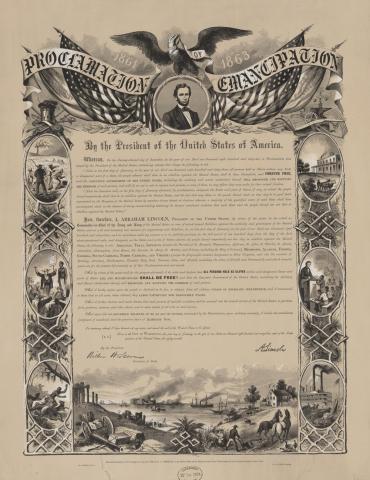
Description
One hundred days after announcing the preliminary Emancipation Proclamation, on January 1, 1863, the final Emancipation Proclamation took effect. The final proclamation differed significantly from the previous one. It designated the areas considered to be in rebellion where "all persons held as slaves ... are, and henceforward shall be free," but also those under Union control and thus exempted from the proclamation. Lincoln urged those freed by the proclamation to find work for reasonable wages and to avoid retaliatory violence. Most importantly, gone were any mention of gradual, compensated emancipation and voluntary colonization, and in their place was the announcement that African-American men would be welcomed into the Union’s armed forces. Lincoln also closed the proclamation by invoking the favor of God. On this broadside, to the left and right of the Emancipation Proclamation are scenes depicting the contrasting life for African Americans before and after emancipation. A portrait of Lincoln from the chest up sits above the proclamation, surrounded by large American flags and an eagle.
Transcript of the Emancipation Proclamation
Source-Dependent Questions
- In what ways did the final Emancipation Proclamation differ from the preliminary version issued 100 days earlier? By declaration, slaves in the designated areas of rebellion "are and henceforward shall be free," but who would slaves need to encounter in order to absolutely guarantee their freedom?
- Section 12 of the Militia Act of 1862 authorized persons of African descent to serve in the Union army, yet Lincoln did not openly call for a general mobilization of them afterward. Why was it significant that in the Emancipation Proclamation he "further declare and make known, that such persons of suitable condition, will be received into the armed service of the United States?"
- Did the purpose of the Civil War change with the issuing of the Emancipation Proclamation? Provide reasoning for your position that includes evidence from the document itself.
- Look closely at the artwork that surrounds the Emancipation Proclamation. According to the printer of this broadside, what impact did the Emancipation Proclamation have on the lives of southern slaves?
Citation Information
Lincoln, Abraham, "1861-1863; Proclamation of emancipation by the President of the United States, [C. A. Alvord]," 1865. Courtesy of Library of Congress